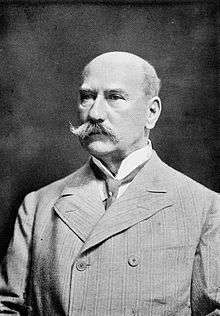Henry Brackenbury
| Sir Henry Brackenbury | |
|---|---|
 Portrait of Henry Brackenbury, by F. B. Ciolina, 1904 | |
| Born |
1 September 1837 Bolingbroke, Lincolnshire |
| Died |
20 April 1914 (aged 76) Nice, France |
| Allegiance |
|
| Service/branch |
|
| Years of service | 1856–1904 |
| Rank | General |
| Battles/wars | Central Indian Campaign |
| Awards |
Knight Grand Cross of the Order of the Bath Knight Commander of the Order of the Star of India |
General Sir Henry Brackenbury GCB KCSI PC (1 September 1837 – 20 April 1914) was a British Army officer who was assistant to Garnet Wolseley in the 1870s and became part of his 'Ring' of loyal officers. He also wrote several books of military history and memoirs.
Life and career
Henry Brackenbury was born in Bolingbroke, Lincolnshire on 1 September 1837.[1] He was educated at Tonbridge School and Eton, then at the Royal Military Academy, Woolwich.[1] He joined the British Army in 1856, served in the Central Indian Campaign in 1857–58 and observed the Franco-Prussian War in 1870–71.[1]
After making Wolseley's acquaintance, Brackenbury offered to join his Ashanti Campaign (1873–74) at which time he became part of the Wolseley ring, and later acted as his military secretary in the Zulu War of 1879–80.[1] Wolseley thought highly of his talents and helped advance his career. However, Brackenbury was unpopular with other colleagues and with Lady Wolseley.
He became Private Secretary to the Viceroy of India in 1880, acted as British Military attaché in Paris between 1881 and 1882, and then became assistant Under-Secretary to the Lord Lieutenant of Ireland.[1] He had a senior role in the River Column in Egypt in 1884–85.[1]
He was promoted to Major-General for distinguished service in the field, then became Director of Military Intelligence in 1886.[1] From 1891 he was a Member of the Council of the Viceroy of India, and in 1896 became President of the War Office Ordnance Committee until 1899. He was made Colonel Commandant of the Royal Artillery in 1897, Director-General of Ordnance in 1899 and promoted to a General 26 September 1901.[1][2]
Towards the end of his career Brackenbury was a patron of Robertson and helped arrange his appointment to do intelligence work at the War Office.[3]
Brackenbury retired in 1904 and was made a Privy Councillor. His married first in 1861 Emilia Halswell (who died in 1905, when they had long been separated), and secondly in 1905 Edith Desanges.[1] He died on 20 April 1914 in Nice, France.[1]
Decorations
Most Honourable Order of the Bath
- Companion, CB 1880
- Knight Commander, KCB 1894
- Knight Grand Cross, GCB, 29 November 1900, in recognition of services in connection with the Campaign in South Africa 1899-1900[4]
- Knight Commander, KCSI 1896 for service as Member of Council in India
Publications
- The Last Campaign of Hanover, 1870
- The Tactics of the Three Arms, 1873
- Narrative of the Ashantee War (2 vol.) 1874
- The River Column, 1885
- Some Memories of My Spare Time, 1909
See also
References
- 1 2 3 4 5 6 7 8 9 10 Henry Brackenbury at Oxford Dictionary of National Biography
- ↑ The London Gazette: no. 27409. p. 1120. 21 February 1902.
- ↑ Woodward 1998, p3
- ↑ The London Gazette: no. 27306. p. 2695. 19 April 1901.
Sources
- Woodward, David R (1998). Field Marshal Sir William Robertson. Westport Connecticut & London: Praeger. ISBN 0-275-95422-6.
Further reading
- Harvie, Ian (March 1999). A Very Dangerous Man - a Profile of Sir Henry Brackenbury. Soldiers of the Queen (Journal of the Victorian Military Society).
| Military offices | ||
|---|---|---|
| Preceded by New Post |
Director of Military Intelligence 1886–1891 |
Succeeded by Edward Chapman |